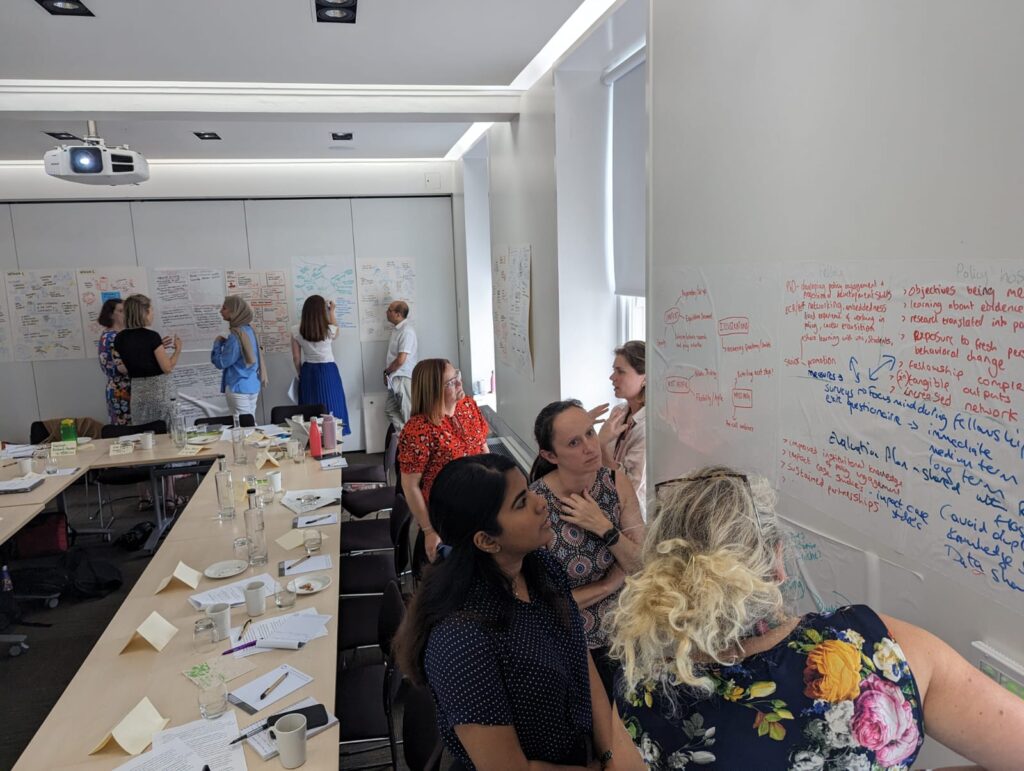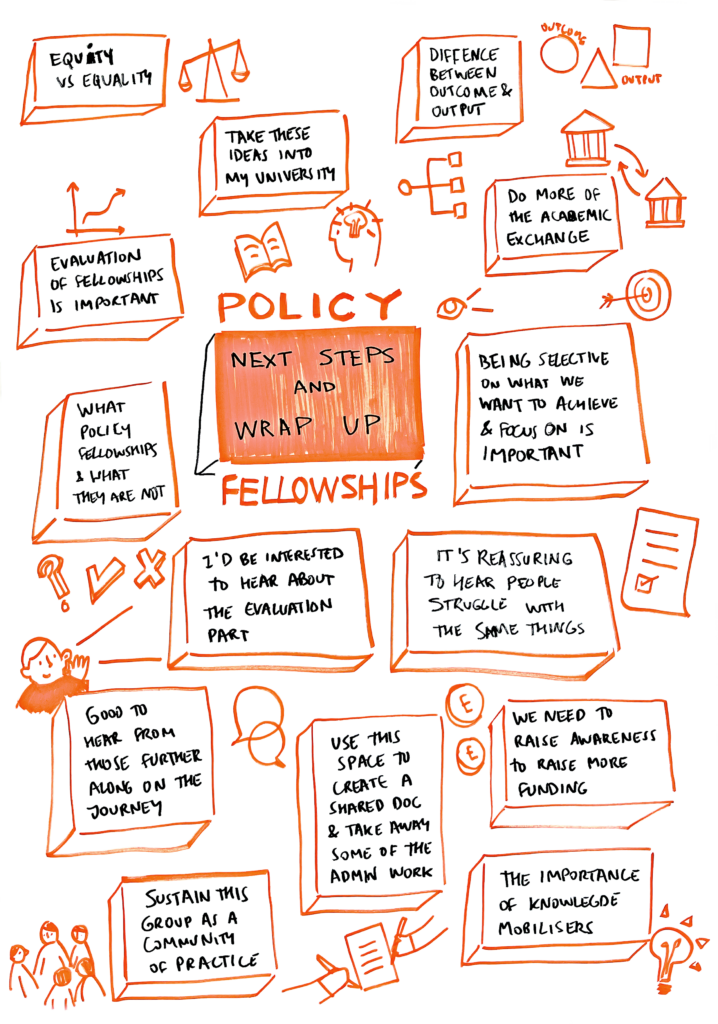With a growing demand for relevant and usable research across various levels of the UK government and Parliament, universities face the challenge of facilitating this exchange effectively. How can we foster more strategic and sustainable collaborations between academia and policy professionals? How can we enhance skills in evidence synthesis and policymaking? Policy Fellowships are increasingly seen as a crucial mechanism for transferring knowledge and research skills between universities and policy organisations.
UCL Public Policy has long supported researchers through secondments to policy organisations. Since 2011, we have partnered with 28 organisations to support over 100 research-to-policy fellowships (often referred to as ‘incoming fellowships’ by universities). Despite this long-standing programme, we continuously strive to improve our fellowship processes and mechanisms, adapting to the evolving needs and demands of both government bodies and researchers. Funding levels, of course, significantly influence our offerings.
Upon starting my role as Policy Fellowships Coordinator, I was struck by the lack of cohesive thinking about fellowships, despite their prevalence across nearly all government departments and many universities. How could both communities harness existing expertise, foster curiosity, and implement more strategic systems across the sectors? One way to initiate this process was by convening a capability-building workshop for university knowledge mobilisers working on policy engagement activities, including fellowships.
The Workshop

Supported and organised by UCL Public Policy and facilitated by Bridgit Sealey from Sealey Associates, the workshop aimed to:
- Explore the challenges, benefits, and opportunities in administering outgoing Policy Fellowship programmes.
- Examine best practices for initiating and developing outgoing fellowship programmes.
- Encourage active participation and knowledge exchange among attendees.
- Enhance capabilities for evidence-informed policymaking.
The workshop brought together representatives from university policy units across the country as well as Kirsty Frior and Daniel Robinson from Economic & Social Research Council (ESRC) who manage the UKRI Fellowship programme. Some organisations have a long history of organising fellowships, while others were in the process of setting up fellowship schemes or considering offering them. Collectively, the group had rich experience in developing university policy engagement programmes, partnering with policy organisations, and supporting academics with their policy engagement strategies.
A central topic of debate in the workshop was: what does success look like, and for whom? To help unwrap this, we looked at the benefits of fellowships for researchers, universities, policy hosts and knowledge mobilisers. We used CAPE’s toolkit ‘Developing and delivering policy fellowships: six pillars for optimising success’ (to be available soon here) as a platform to discuss how participants apply these principles within their own contexts. But how do we measure success? The group agreed that robust evaluation of fellowships is crucial. This evaluation should be approached with honest self-reflection, transparency, and creativity. By engaging in this process, we can ensure that fellowships deliver meaningful impacts and continuously improve based on clear, shared criteria.
“The fellowship event was incredibly informative and helpful as we at Durham University look to set up our own fellowship scheme. It was great to get top tips from other institutions about what was working well and to gain an understanding of where challenges can arise. We will be taking forward many of the suggestions that came from the event. We look forward to seeing the reports from UKRI and CAPE on the evaluations of their fellowship schemes and hope that this event is the start of more collaborative working.” Lisa Hodgson, Policy Impact and Engagement Manager, Durham University.
Implications for the Sector
The workshop did not aim to provide definitive answers for managing fellowships but rather to raise important questions for universities, policy organisations, and funding bodies on how to best support these knowledge exchange initiatives. Many attendees shared common challenges in managing partnerships and processes: onboarding difficulties, contract negotiations, securing senior staff approval, and balancing what academics want to share from the fellowships with what they are contractually obliged not to disclose.
While these shared challenges were reassuring, they also highlighted the need for collaborative approaches to problem-solving and system improvement in managing fellowships. The broader questions raised were relevant not only to the individuals at the forefront of these exchanges but to the sector as a whole.
“It was great to have the opportunity to engage with the university knowledge mobilisers. In two rounds of Policy Fellowships, UKRI have placed over 70 academic researchers into government departments, devolved administrations and What Works Network Centres and it was the ideal time to have a two way discussion on what’s gone well and where we can continue to make improvements. We were able to share early learnings from an external evaluation of the 2021 policy fellowship call, conducted by the University of Sheffield, and being able to discuss the recommendations, and the similarities to CAPE’s six pillars for optimising success, emphasised the cross cutting benefits and challenges we are all facing.
In particular it was incredibly helpful to gain a better understanding of university policy engagement programmes and the day underlined how schemes such as the CAPE and UKRI Policy Fellowship are partnership based, so the better the understanding and shared vision of the partners, the more successful they are likely to be. A really valuable day and we are keen to continue building these partnerships.” Kirsty Frior, Senior Research Portfolio Manager, Economic & Social Research Council (ESRC).

The group emphasised the importance of supporting academics in balancing their multiple roles while avoiding burnout. This ultimately boils down to valuing and properly resourcing these efforts. Fellowship programmes offered across the country offer vital opportunities to democratise policymaking. It was agreed that raising awareness of the value of fellowships for professional development, institutional expertise and evidence synthesis is crucial. Again, this involves simplifying the processes by which fellowships are developed, ensuring alignment of purpose and resources across universities and policy organisations and finally, finding effective ways to evaluate fellowships and thus measure their impact. Hopefully, the group will continue to explore these opportunities in future meetings.
If you would like to be part of these conversations, please get in touch with Alice Tofts, Policy Fellowship Coordinator, UCL Public Policy, alice.tofts@ucl.ac.uk


